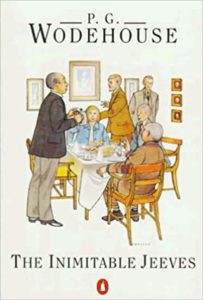Book Review: The Inimitable Jeeves by P.G. Wodehouse
Bertie Wooster may not be the sharpest tool in the shed, as he will sometimes admit. But compared to some of his friends among the idle rich of England, Bertie’s a model of intellect and common sense. For example, Bertie knows that keeping his valet Jeeves in his employment is in his best interest. Jeeves is highly competent, and often solves the little problems of life. As when, for example, Bertie’s old pal Bingo Little falls in love with a waitress far below his social class, and needs to convince his uncle to approve.
Jeeves’ plan of introducing the old man to romance novels where the main characters are of very different classes works a treat, but then Bingo decides to pass Bertie off as the author, resulting in shenanigans. And that’s just the beginning of a very eventful year!
P.G. Wodehouse began writing the Jeeves stories in 1915 and continued until 1974; this volume is relatively early, coming out in 1924. The combination of the highly competent valet (personal manservant) Jeeves and his bumbling employer Bertie Wooster and their misadventures makes for some fine comedy. By this volume, Bertie has inherited enough money to be independently wealthy (though there are some financial squeezes) but still faces family pressure to get married.
Bertie likes women well enough, but has no intention of getting married any time soon. His domineering Aunt Agatha believes that a proper wife would be just the thing to improve her feckless nephew. And it doesn’t help that Bertie has a doltish charm that convinces young women that he is proposing to them when in fact he’s just being nice or trying to set them up with a friend.
In the series of stories that have been stitched together to make up this novel, that friend is “Bingo” Little, who falls in and out of love at the drop of a hat. The waitress who begins the book is soon forgotten as Bingo ropes Bertie and thus Jeeves in on zany schemes to capture the hearts of his new love interests. Particularly bizarre is when Bingo masquerades as a Communist agitator in a wild beard to win the affections of a Leftist girl. And at the end of the book–that would be telling.
Bertie also has adventures unrelated to Bingo, running afoul of jewel thieves, visiting America and trying to discourage a would-be actor, and gambling on country festivals. In each case, it’s Jeeves who saves the day one way or another–sometimes delayed by disapproving of Bertie’s unorthodox taste in clothing accessories. (Bertie has a thing for the gaudy if he’s not watched closely.)
Dim Bertie may be, but he’s a splendid narrator, delivering the punchlines right on time. The book ties up nicely, with callbacks to events throughout the individual adventures.
There’s a certain amount of genteel period sexism, and Bertie is shallow about women’s personal appearance and personality quirks. A little knowledge of British culture of the 1920s will help understand certain events.
Recommended to people interested in light comedy about upper-crust British people.

